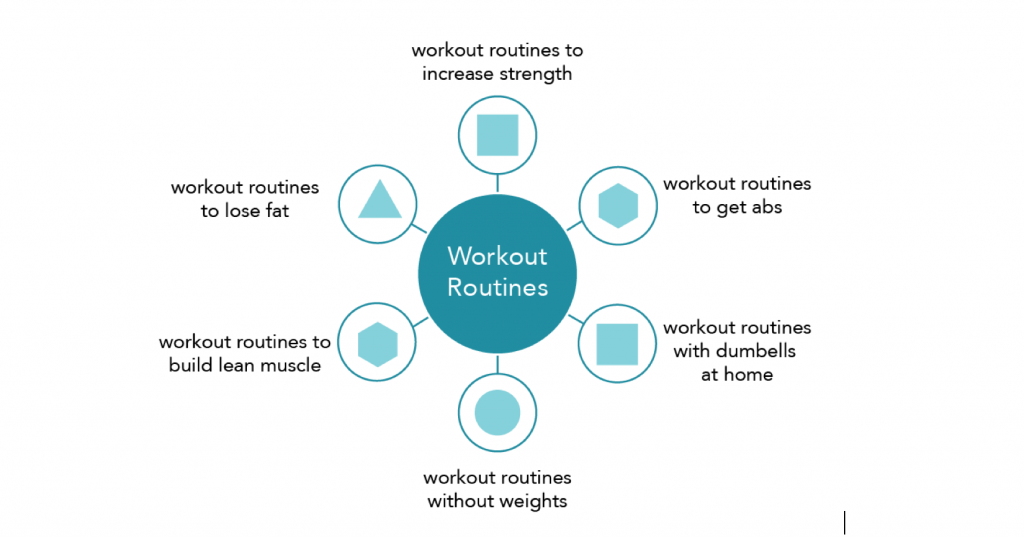You've probably heard people talk about topic clusters before, but you should know they're much more than a buzzword. Any content professional worth their salt will tell you that topic clusters are key for attracting and retaining visitors, as well as gaining a competitive edge in the SERPs.
Want to see what topic clusters can do for your brand? We've leveraged our experience to answer your most burning topic cluster questions.
What Is a Topic Cluster?
Long story short, a topic cluster is a group of pages that all contain content relating to a particular topic. Crucially, those pages all link back to the main page on the topic — this is known as the pillar page.
In this example, "workout routines" is the main topic. As such, it has its own pillar page, and it's surrounded by several other pages on closely related subtopics that all link back to it:

Topic clusters can also be referred to as content hubs or the hub and spoke model. But no matter what you call it, it all comes back to the same core elements:
- A main topic with its own pillar page
- Several auxiliary pages on related subtopics
- Internal links connecting the auxiliary pages to the pillar page, as well as to each other
Those elements can be used to form topic clusters on any subject imaginable, whether it's SaaS, health and wellness, scientific breakthroughs, or just videos of adorable dogs.
Why Are Topic Clusters Important?
Knowing what topic clusters are is all well and good, but why should you care about them?
There's not one but two good reasons: improving your site's user experience and achieving better search engine rankings.
Topic clusters enable you to do so because they make your site better organized and easier to navigate, meaning both humans and search engine bots can quickly find pages related to the one they're on.
On top of that, topic clusters also serve to clarify your brand's areas of expertise. After all, you'd probably only bother to create detailed topic clusters on subjects you're qualified to speak on, and your readers (whether they're human or otherwise) know that.
So while topic clusters might not be a direct ranking factor, they can indirectly boost your site's search engine rankings by bettering its user experience and overall organization.
How Do You Identify a Topic Cluster?
The first topic cluster you should focus on will be easy to ascertain. To identify them, simply consider your brand's purpose and the main products it offers.
For instance, let's say your organization creates an SEO tool that's used by other companies. That fact alone will give you the pillage page of your first topic cluster: SEO. Subtopics you can cover in supporting pages include SEO tips, SEO tools, technical SEO, on-page SEO, SEO for beginners, and so on.
To identify other, less obvious topic clusters, you'll need to do a little digging. Start by doing some competitor research — let's say you do so using a tool like SimilarWeb.
There, you discover that some of your competitors don't just talk about SEO but also content marketing. Thus, you can turn that subject into your next topic cluster, followed by closely related topics such as social media marketing.
You can also identify new topic clusters by taking a closer look at your customers, building out their buyer personas, and pinning down their interests and pain points. To put it simply, whatever they're looking up, you can create topic clusters for.
Those same techniques can be used for brands in any industry under the sun, so don't hesitate to use them for yours and start discovering the topic clusters you should be targeting.
How Do You Create Topic Clusters?
Once you've identified your brand's most important topic clusters, it's finally time to create them.
To begin, you'll need to create pillar pages for each one. These should cover their respective topic in-depth, as they'll need to naturally incorporate backlinks to every subtopic page.
Think of a Wikipedia page to understand what you're going for. For example, Wikipedia's page on the fauna of Africa takes a close look at various types of African animals. In doing so, it's able to link to pages about subtopics such as:
- lions;
- rhinos;
- cheetahs;
- giraffes; and
- hundreds of species of birds, insects, mammals, and more.
That's exactly what each of your pillar pages should do: provide a content-rich hub from which a variety of different subtopics can be quickly and easily accessed.
Once your pillar pages are in place, start building out the subtopic pages they'll link to. These may already exist on your site, or you may have to invest in creating all-new pages.
Whatever the case, just be sure to focus on quality, whether that means reworking old content to be the best it can be or taking the time to create top-notch new content that will stand the test of time. If you do, you'll be able to cement your brand's authority in the topics that matter to it most.
Topic Clusters Are the Future of SEO
As Google's algorithms grow increasingly advanced, search engines are only getting better at identifying when a brand is actually knowledgeable about a subject and when it's just acting the part.
And at the same time, the sheer amount of content available on the internet is giving human users higher and higher standards, too.
As such, topic clusters aren't just a buzzword or a quick trick for more traffic — they represent the future of SEO and the ever-apparent truth that quality really is better than quantity.







